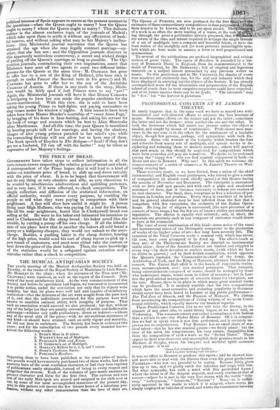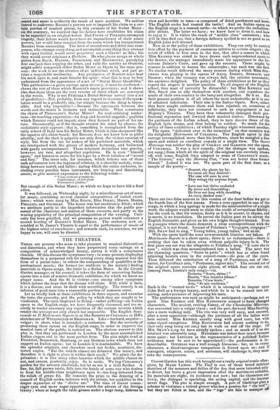music. Sometimes efforts are the former and not the latter
; sometimes the latter and not the former ; often neither the one nor the other. In both the instances which fall under our present notice the object is similar, and sought by means of combination. Professional men asso- ciate, in the one case as in the other, for the attainment of a laudable object, though few persons, perhaps, will sympathize with both fra- ternities. Some will wonder at the industry which brushes the dust and cobwebs from musty sets of madrigals, and spends weeks in de- ciphering and reducing them to modern notation ; others will marvel that such music as this should be neglected for compositions which were born yesterday and may die tomorrow. We desire to be reckoned among the "happy few " who can find musical enjoyment in both—in BYRD and also in Rosana. Why not? In this spirit we welcome the commencement of a series of concerts at St. James's Theatre on Wed- nesday evening last.
These concerts result, as we have hinted, from a union of the chief
instrumental and English vocal performers, who intend to give a series of compositions (it should seem chiefly sacred) at this theatre during the months of November and December. The enterprise is announced with so little puff and parade, and with such a plain and unadorned statement of facts, that it becomes necessary to inform our readers of its real character. The band, then, comprises as fine a selection of per- formers as London can produce. Every thing is excellent of its kind and its general character may be best inferred from the fact that it comprises, with few exceptions, the orchestra of the Italian Opera- house. No long list of singers is announced, (the sure precursor of a concert of mere songs,) but the few are of known ability and established reputation. The chorus is equally well selected ; and, in short, the materials are precisely such as any composer of eminence would desire to have at his command.
The want of some combination of this kind—some union of the vocal
and instrumental talent of the Metropolis competent to the production of works of the higher order of art—has long been severely felt. The cessation of the Vocal Concerts made a musical void, which has never, till now, been even attempted to be filled up. The efforts (such as they are) of the Philharmonic Society are directed to instrumental music alone : those of the Ancient Concert are limited and crippled in every way—by their devotion to ancient music, (with which we have no desire to quarrel,) and by their foolish constitution, which appoints the Queen's husband, the Commander-in-chief of the Army, the Archbishop of York, and the King of Hanover, alternate Directors of a concert. The Exeter Hall affair is in the hands of respectable trades- men, metamorphosed, alas ! into musical potentates. That concerts, being entertainments composed of music, should be managed by those who understand music, would seem to follow of necessity ; but in Lon- don the professional management of concerts forms the exception, not the rule. Hence, there is no place in which many great musical works can be produced. It is scarcely credible that the two compositions which have the most extensive and enduring popularity in Germany should never have been heard in London at any public performance— Der Tod Jesu of GRAUN, and the Requiem of MOZART. We abstain from mentioning the compositions of living writers, of no mean Conti- nental celebrity, which equally deserve our musical regards.
These Professional Concerts (for so we will take the liberty, in the
absence of any other title, to name them) began, as we have said, on Wednesday. The commencement was rather a compliance with fashion than a tribute to art—the Stabot Mater of ROSSINL Of tl is composi- tion we had to speak when it was first performed, and it certainly im- proves not on acquaintance. That Rossiici has no small share of mu- sical talent—that he has also musical genius—we freely admit : but the tone of his mind, his temperament, his very nature, disqualifies him from the composition of such a work as the Stabat Mater." These appear in their true character and accomplish their genuine result in his Barbiere di Siviglia, where his buoyant and mirthful spirit animates
every phrase : it is all " Sport that wrinkled Care derides, Aud Laughter holding Isoth his sides."
It was no effort to ROSSINI to produce this opera ; and he showed him- self more able to deal with the libretto than even his great predecessor pAnnELL0—who was too graceful to be merry. ROSSINI fairly girls him up to fun, and we gladly catch the infection and laugh with him. But what sympathy has such a mind with this penitential hymn ? where the scene is of the deepest anguish, and every sentiment that of sorrow—where be is met in the very first stanza with the words " doks- rose," " lachrymose," " dolentem," " flentem "? None—as is suffici- ently apparent in the music to which it is adapted, where words are simply employed as vehicles of sound, and where the consonance between sound and sense is evidently the result of mere accident. We neither intend to underrate ROSSINI'S powers nor to impeach his claim to a cer- tain portion of musical genius, by this estimate of his Stabat Mater : on the contrary, we contend that his failure here establishes his claim to be regarded as an original writer. Had FooTE or FIELDING attempted tragedy, their failure would have been no impeachment of their comic powers, but would have resulted from the cause which has incapacitated Roma' from succeeding. The herd of second-rate and third-rate com- posers, who attempt every thing, and accomplish every thing they attempt with equal facility, would never perpetrate such a blunder as this ; but they would never originate a Barbiere. He who gleans scraps or whole pieces from BACH, HANDEL, PERGOLESI, and BEETHOVEN, parodying first one:and then copying the other, and calls the medley an Oratorio, might safely compound either Stabat Mater or Opera by the same pro- cess: the work is not the creation of an individual mind, and just at- tains a respectable mediocrity. Any production of Rossm must bear his mark upon it, and must breathe his spirit : what that is may be best understood from the appearance of a set of "Stabat Mater Quadrilles." This publication—a gross outrage upon decency, it must be confessed— shows the sort of ideas which ROSSINI'S music generates ; and it shows also that those ideas are the very reverse of those which are conveyed in the words. Why is not PURCELL'S Burial-Service turned into a set of quadrilles 2—Not, probably, from any regard to decorum if the specu- lation would be a profitable one, but simply because the thing is impos- sible. And why impossible 2—Because the agreement between the words and the music is intimate and indissoluble. What constitutes the charm of PERGOLESI'S Stabat Mater? Its soul-subduing tender- ness—its touching expression—its deep and heartfelt anguish ; qualities which ROSSINI could not impart, since they formed no part of his na- ture. Occasionally, as if the thought crossed his mind by chance, the ecclesiastic style appears : that is, something is transplanted from the early school of Italy into his Stabat Mater, which is thus chequered like the-squares of a chess-board: but ROSSINI does not know how to pilfer adroitly,: and the theft is palpable not only from the violent contrast of style, but from the use he makes of his purloined materials, which are interspersed with the graces of modern harmony, and bedizened with gaudy accompaniment. These reluctant deviations into gravity, however, are rare, and altogether capricious. He is soon "himself again," and hastens to atone for his lapse by a fresh infusion of" sound and fury." The tenor solo, for instance, which follows one of these rash adventures into the regions of sobriety, is a cheerful melody, some- thing between march and ballet ; during which the entire orchestra, in- cluding every possible brass instrument, are braying and thundering amain, to give musical expression to the following words-
" Cujus animam gementem. Contristatam, at dolentem Pertransivit gladius."
But enough of this Stabat Mater ; to which we hope to have bid a final adieu.
It was followed, on Wednesday night, by a miscellaneous act of secu- lar music, combining several classical compositions of varied excel- lence; which were sung by Miss BIRCH, Miss DOLBY, Messrs. HOBBS, Pirmires, and Giusium. The house was but moderately filled ; which we attribute partly to the imperfect information that the public pos- sessed of the character and station of these concerts, and partly to the waning popularity of the principal composition of the evening. Curi- osity has been gratified, and we presume no person would volunteer a second hearing of Rossma's Stabat Mater. The orchestra now as- sembled at St. James's Theatre is equal to the performance of music of the highest order of excellence ; and towards such, its attention, we are happy to see, will soon be directed.



























 Previous page
Previous page